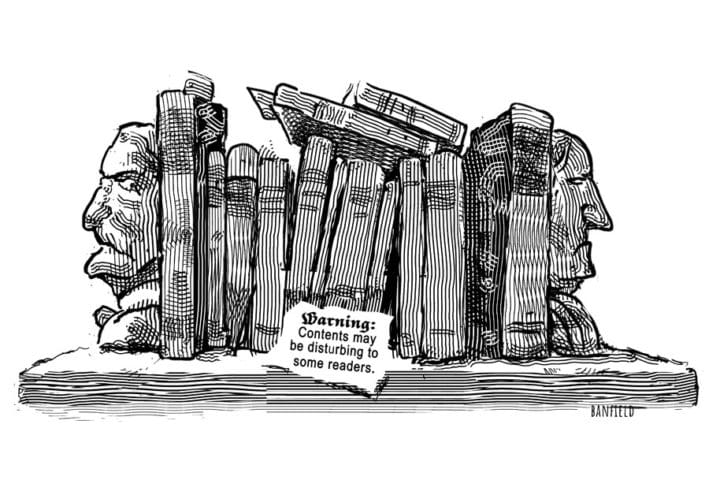Seldom are the oft-heard condemnations of nationalism accompanied by any kind of adequate definition. The meaning of the word, like that of the “social contract,” is as elastic—brace for mixed metaphor—as there are eyes in its beholders. And the elasticity is unavoidable because by nature the term is parametric, a parameter being a constant applied to variables. Take for example a defense budget of 5% GDP. If the GDP is $10 trillion, defense will get $500 billion; if $20 trillion, $1 trillion. Always and everywhere, the complexion of nationalism depends upon its context. At present, Russian nationalism is ravishing Ukraine, but Ukrainian nationalism is defending it. Only out of stupidity, opportunism, or expediency would someone conflate the two.
The definition of a nation is parametric as well, which leads to some interesting effects. Like H.G. Wells’s character, nationalism can become willfully invisible. The continuity of the tsarist and Soviet drive to empire would seem to suggest that the latter’s fervor for world revolution was largely nationalism in a Communist glove—a spectacular con job on the West’s useful idiots who, while reviling nationalism, were its unwitting agents.
And like Macbeth’s dagger, it can insubstantially appear to those whose inner needs compel them to see it. For example, for Donald Trump to be aware of—much less conform to or implement—an ideology is about as likely as Jerrold Nadler outrunning a bolt of lightning. (This may be unfair, but the image is electric.) And yet, the dauntless Einsteins who compared Trump to Hitler were convinced that he was the kind of nationalist of which they disapprove, primarily because he was hostile neither to the idea of a nation nor to the one which by some freak of nature he came to lead. Although the unfortunate use of the slogan “America first” found expressive translation as Amerika über alles, isolationist policy per se is no more or less nationalistic in the condemnable sense than is a policy of strong alliances and foreign interventions.
If you are hostile to a particular nation you can taint anodyne love of country with the color of Hitler’s Germany or Stalin’s Russia. Perhaps not coincidentally, those who do, also do the opposite, and are reliably misty-eyed for movements of national liberation, from the Mau Mau to the Viet Cong, the PLO, or the Black Panthers (who, granted, could really liven up a cocktail party).
Very much part of the 20th century—in the 19th, nationalism was generally viewed as a species of heroism—seizure of the term to suit particular prejudices or the vanishing moment crossed ideological lines. Though obviously stung by German nationalism if anyone ever was, and yet a French nationalist if anyone ever was, Charles De Gaulle attempted to resolve the apparent paradox thusly: “Patriotism is when love of your own people comes first; nationalism, when hate for people other than your own comes first,” a completely arbitrary definition pulled straight from his képi.
Often underlying negative interpretations of this protean term is hostility to the idea of a nation itself. Anyone of a certain age who grew up surrounded by what were impolitely but accurately called “’30s Reds” (if you don’t know what that is, behold Bernie Sanders, a perfect replica) has sat through interminable bloviations in which nationhood was assaulted as a source of evil. No matter that in the same struggle sessions national liberation was approached with religious reverence—and the magazine that set its seal on such nonsense was called The Nation—the ex-cathedra pronouncements were as grave as they were, in fact, impeachable.
* * *
To wit, what is possible absent the nation-state? Anarchy, of course (although, like unstable atoms seeking molecular wedded bliss, anarchists soon agglomerate into increasingly larger and inevitably repressive forms of organization), or perhaps a utopian tapestry of local governance—the New England town meeting writ repetitively, but that, too, if it is to survive, must agglomerate. The Thirteen Colonies were a good example of this, with Alexander Hamilton’s proofs in The Federalist exceedingly brilliant in explaining exactly why. Given immense variability in the geographic sizes, populations, and powers of nations, it is possible to argue that, though intended to be local, a government that can police, protect, and maintain itself free of external dictates is in fact a nation. One might protest that mini-states such as the Vatican, Monaco, or Luxembourg have depended upon the sufferance or protection of others, but so on a greater scale have Denmark, Kuwait, Canada, et al.
In these respects the nation-state is insidious. In many forms it takes root easily and appears where its detractors think it is something other than what it is, which may be one explanation of why some can oppose and advocate it in almost the same breath. But like Alexander slashing the Gordian Knot, the critics dismiss the virtues, necessity, and inevitability of the nation-state and advocate in replacement its rival and the persistent object of their affection, world government—with titillating foreplay in the League of Nations, fantasies of Leninist universal revolution, the U.N., and even the kiss of Esperanto.
And like George III they sniff at “self-proclaimed” nations, perhaps forgetting that if a nation is other than self-proclaimed it is a vassal teetering upon the edge of legitimacy. Only a fool, they might say, would not see that the harmony and coordination of an overarching, all-powerful, global regime would put everything in order and make obsolete the differences and structural inconsistencies that lead to conflict and war. Indeed it would, at a steep price, and as something opponents of nationhood and advocates of world government often, habitually, and passionately revile: that is—surprise—imperialism. Perhaps they would take comfort in stating that consistency is the hobgoblin of little minds. Something for sure is the hobgoblin of little minds, but it isn’t consistency.




